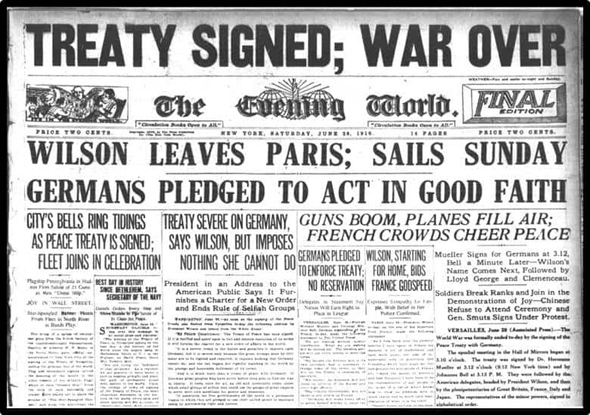1. Was the Treaty of Versailles fair?
 The First World War finally lasted from 1914 to 1918.
The First World War finally lasted from 1914 to 1918.
After the armistices![]() were signed with the Central Powers in November 1918, the victorious powers met met at Versailles near Paris in 1919 to discuss and agree terms for a peace settlement.
were signed with the Central Powers in November 1918, the victorious powers met met at Versailles near Paris in 1919 to discuss and agree terms for a peace settlement.
Europe was in chaos. 10 million people had died in the war, there was starvation and a deadly flu epidemic. There was also widespread physical and devastation which had dire economic consequences. Where the fighting had taken place on the western front, France and Belgium had lost land and industry e.g France had 2 million hectares of farmland rendered unusable. Italy was also badly effected, and in the east Poland and Serbia were devastated. Roads and railway lines needed to be reconstructed, arable land had to be cleared of unexploded shells and hospitals and houses had to be rebuilt.
The war had led to the collapse of the Russian, Austro-Hungarian and Ottoman Empires. The Bolsheviks had established the first communist state in Russia, and there was fear that its ideology and revolution could spread across Europe in the post war period. Its former imperial territories in Europe had declared independence; the Hungarians, south Slavs and Czechoslovaks had also declared independence from Austria-Hungary and there was a power vacuum in the Balkans.
It was in this complex and difficult context that the leaders of France, Britain, the USA, and Italy struggled to to create a lasting peace settlement.
In this section you will look at the aims of the peacemakers who came to Versailles in Paris to try to create a peace settlement and the extent to which they were successful in achieving this. The pages below cover the key questions that you need to examine:
1. What were the motives and aims of the Big Three at Versailles?
Following the armistice of 1918, the Allied leaders met to sort out peace terms at Versailles, France. This was a time of great optimism with many hoping that any peace deal would follow the ideas put...
2. Why did all the victors not get everything they wanted?
As you have seen, there was disagreement between the Allied leaders as to what they wanted from a Treaty with Germany; this inevitably meant that none of the victors were totally happy with the final...
4. Could the Treaty be justified at the time?
While many amongst the Allies believed the Treaty to be justified - even too moderate in its terms, there were others in 1919 who believed the Treaty of Versailles to be unjust.Activity: Video (AO1)
5. What was the impact of the other treaties on the defeated countries?
The Treaty of Versailles dealt with specifically with Germany.Four separate peace treaties were signed: with Austria (the Treaty of St Germain), Hungary (Treaty of Trianon), Bulgaria (Treaty of Neuilly),...

